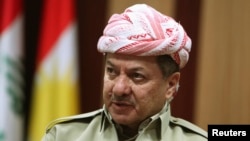Iraqi Kurdish leader Masoud Barzani's public support of Turkey's president in putting down a military coup reflects his strongly pragmatic approach to regional power politics.
Despite President Recep Tayyip Erdogan’s recent, severe crackdown on Turkish and Syrian Kurds, the Iraqi Kurdish leader praised the Turkish people for coming out on the streets to fight for their “democratically elected” leader.
“Attempts to overthrow an elected civilian government by using arms is condemned, as the logic of violence is against democracy, political stability and coexistence,” read a statement released by the Kurdistan Region Presidency.
The statement spoke to Barzani’s distaste for any hint of aggression against his regional power backer Erdogan.
Until recently, Erdogan also was seen as having transformed relations between the Turks and Kurds inside Turkey and in neighboring countries.
“As a result, the KRG-Turkey relations improved exponentially, leading to a strategic partnership with unprecedented economic and political benefits to both sides,” said Dlawer Ala’Aldeen, president of the Middle East Research Institute in Irbil.
“A military coup, if successful, would have at best brought about new uncertainties, and at worse would have taken the two countries back to the old days,” Ala’Aldeen said.
Splintered Kurds
The ties between Barzani and his ruling KDP party and Erdogan are not only political, explained Tim Eaton, a Middle East analyst at Chatham House, pointing out “the strong influence that Turkish companies have over the KRI economy.”
Investment in the Kurdish Region of Iraq is dominated by Turkey, and despite the recent economic slump in the KRI, Turkey continues to have extensive interests in the autonomous Iraqi region.
Also, regardless of their strong ethnic ties, the Kurds in Turkey, Iraq, Iran, Syria remain politically divided, and there is a lot of factionalism within the groups.
“Each of those factions tends to have an international backer to help them press their claims,” Eaton said. Turkey is Barzani’s regional force.
Yet even within Iraqi Kurdistan there are divisions, falling along largely political lines: the ruling KDP party, and the opposition Gorran and PUK parties. The PUK, centered in Kurdistan’s city of Suleymania, is seen as pro-Iran.
“We have a weird political texture,” said Hayman Awrahim, a KRG analyst for Inside Iraqi Politics.
“There are the Islamists, who see Erdogan as the new caliphate leader resurrected for the 21st century, who were against the coup; the KDP, who for power and business reasons were also against the coup; but then the PUK who thought it could be a good thing; and Gorran, who didn’t necessarily back Erdogan but also did not see any good out of a military coup.”
Erdogan’s fledgling political reconciliation with Turkey’s Kurds collapsed last year when he took a discernible tilt to the political right to expand his power base and began cracking down on the Turkish Kurdish PKK party.
Unwelcome coup
Even so, for most Kurds — including those inside Turkey — the prospect of a hawkish military rule was not a welcome alternative.
“I don’t believe that certainly Turkey’s Kurds would have seen this coup as something in favor of their aims. In fact, in many ways, had the military coup succeeded, Turkey’s Kurds might conclude they would be in a worse position under a military junta,” said Eaton.
The pro-Kurdish People’s Democratic Party (HDP) in Turkey came out and opposed the coup, and was thanked directly for its support by Turkish Prime Minister Benali Yildirim.
“It is one of the most remarkable elements of this,” Eaton said. “They should certainly be praised for backing the democratically elected government.”
But there are no expectations that Erdogan will change his antagonistic stance against Turkish and Syrian Kurdish militants, whom he views as terrorist threats.
Some see Barzani’s support of Erdogan’s democratically elected government ironic, given that the Iraqi Kurdish leader has remained in power even though his term officially expired in 2015.
Barzani has faced stiff political challenges by both Gorran and the opposition PUK, who claim Barzani has exceeded his mandate.
“Barzani has responded that in essence the security situation has determined that he needs to stay to sort out these problems,” said Eaton.
But given Barzani’s strong hold on power and his drive behind the Iraqi Kurdish independence movement, “whether he actually sees himself as term-limited is highly questionable,” Eaton added.
If nothing else, the Kurds in Iraq have proven themselves to be pragmatic in a region rife with complex allegiances and conflicts.





